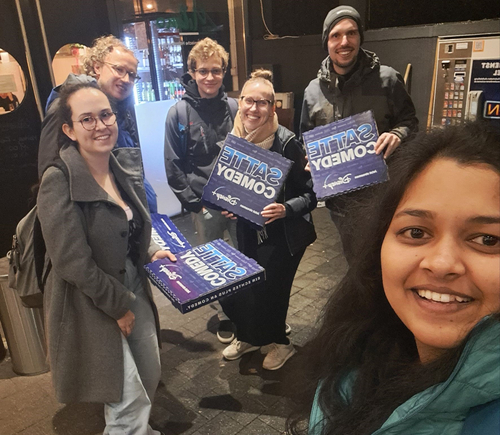Projects Offered
Helle Ulrich Helle Ulrich_actin Helle Ulrich_4R Christof Niehrs_Bioinfo Christof Niehrs_4R Christof Niehrs_Ageing SvenDanck_4R Jan Padeken_4R Andreas Wachter_4R Roopesh Anand_4R Petra Beli_4R Brian Luke_4R Dorothee Dormann_4R Thomas Hofmann_4R Maria Felicia Basilicata_4R Katja Luck Sina Wittmann Sandra Schick Stamatis Papathanasiou Ari Waisman Wolfram Ruf Uwe Wolfrum Johannes Mayer_SkinDC Johannes Mayer_Exhaust Johannes Mayer_APCImmune cell exhaustion of antigen presenting cells in chronic infection and cancer
1 PhD project offered in the IPP winter call Molecular Biomedicine & Ageing
Scientific Background
Immune cell exhaustion is a common phenotype in chronic infection and cancer and has been linked to the continuous exposure to antigens. While its mechanism is well understood in T cells, it is unclear if antigen presenting cells also undergo immune cell exhaustion and show reduced activation potential after continuous exposure to antigens.
Monocytes, macrophages and dendritic cells are the major myeloid cell populations involved in antigen presentation. They are also important cytokine producers and express an array of costimulatory molecules to activate and amplify adaptive immune responses. Monocytes, macrophages and dendritic cells possess a sophisticated machinery to take up and present antigens and many of their cellular functions are linked to the recognition of danger and pathogen associated molecular patterns. While many myeloid cell populations are short lived, recent findings show that innate immune cells also possess mechanisms for memory responses, leading to increased activity during secondary antigen challenge. We therefore hypothesize that these cells might also undergo immune cell exhaustion, resulting in reduced cellular activity, anergy and even cell death, and a suboptimal activation of T cells upon continuous exposure to antigens and plan to study this in the context of chronic infection and cancer.
PhD Project: Immune cell exhaustion of antigen presenting cells in chronic infection and cancer
Within this project we have three sub-aims:
Aim 1: Develop an in vitro model to study the effects of continuous antigen exposure in monocytes, macrophages and dendritic cells
Aim 2: Study mechanisms of trained immunity and immune cell exhaustion of antigen presenting cells in the context of chronic infection and cancer
Aim 3: Identify the molecular machinery of immune cell exhaustion in antigen presenting cells in comparison to exhausted T cells and develop treatment approaches
This project depends on freshly generated primary immune cells from murine or human blood and bone marrow, as well as in vivo studies using murine models, as immortalized cell lines insufficiently display immune cell exhaustion characteristics. This project aims to identify a fundamental biological mechanism in immune cells and assess its relevance in chronic infection and cancer models.
In Aim 1 you will become an expert in generating monocytes, macrophages and dendritic cells from primary murine and human material (mainly blood and bone marrow) and develop techniques to study the effects of repeated and continuous antigen exposure. Importantly, you will be tasked to extend the life span of these cells to study changes in antigen uptake, antigen presentation and cellular activation after repeated and continuous antigen exposure using molecular and imaging techniques.
In Aim 2 you will use high-dimensional flow cytometry and other omics approaches to study mechanisms of trained immunity and immune cell exhaustion of antigen presenting cells in the context of chronic infection and cancer. Here you will primarily focus on bone marrow progenitors and changes they undergo on a cellular, transcriptomic and epigenetic level and how these changes lead to a modified functional response in mature monocytes, macrophages and dendritic cells.
In Aim 3 you will use these findings to compare immune cell exhaustion in antigen presenting cells to exhausted T cells and identify treatment approaches that reverse immune cell exhaustion in both cell types.
If you are interested in this project, please select Mayer (Exhaust) as your group preference in the IPP application platform.
Publications relevant to this project
Mayer JU, Hilligan KL, Chandler JS, Eccles DA, Old SI, Domingues RG, Yang J, Webb GR, Munoz-Erazo L, Hyde EJ, Wakelin KA, Tang SC, Chappell SC, von Daake S, Brombacher F, Mackay CR, Sher A, Tussiwand R, Connor LM, Ortega DG, Jankovic D, Gros GL, Hepworth MR, Lamiable O, Ronchese F. (2021) Homeostatic IL-13 in healthy skin directs dendritic cell differentiation to promote TH2 and inhibit TH17 cell polarization. Nat. Immunol.,1 (13). Link
Blank CU, Haining WN, Held W, Hogan PG, Kallies A, Lugli E, Lynn RC, Philip M, Rao A, Restifo NP, Schietinger A, Schumacher TN, Schwartzberg PL, Sharpe AH, Speiser DE, Wherry EJ, Youngblood BA, Zehn D. (2019) Defining 'T cell exhaustion'. Nat Rev Immunol. (11):665-674 Link
Bosteels C, Neyt K, Vanheerswynghels M, van Helden MJ, Sichien D, Debeuf N, De Prijck S, Bosteels V, Vandamme N, Martens L, Saeys Y, Louagie E, Lesage M, Williams DL, Tang SC, Mayer JU, Ronchese F, Scott CL, Hammad H, Guilliams M, Lambrecht BN. (2020) Inflammatory Type 2 CDCs Acquire Features of CDC1s and Macrophages to Orchestrate Immunity to Respiratory Virus Infection. Immunity, 52 (6), 1039-1056 e9. Link
Netea MG, Domínguez-Andrés J, Barreiro LB, Chavakis T, Divangahi M, Fuchs E, Joosten LAB, van der Meer JWM, Mhlanga MM, Mulder WJM, Riksen NP, Schlitzer A, Schultze JL, Stabell Benn C, Sun JC, Xavier RJ, Latz E. (2020) Defining trained immunity and its role in health and disease. Nat Rev Immunol. (6):375-388 Link
Contact Details
Prof. Dr Johannes Mayer
University Medical Center Mainz
Department of Dermatology
